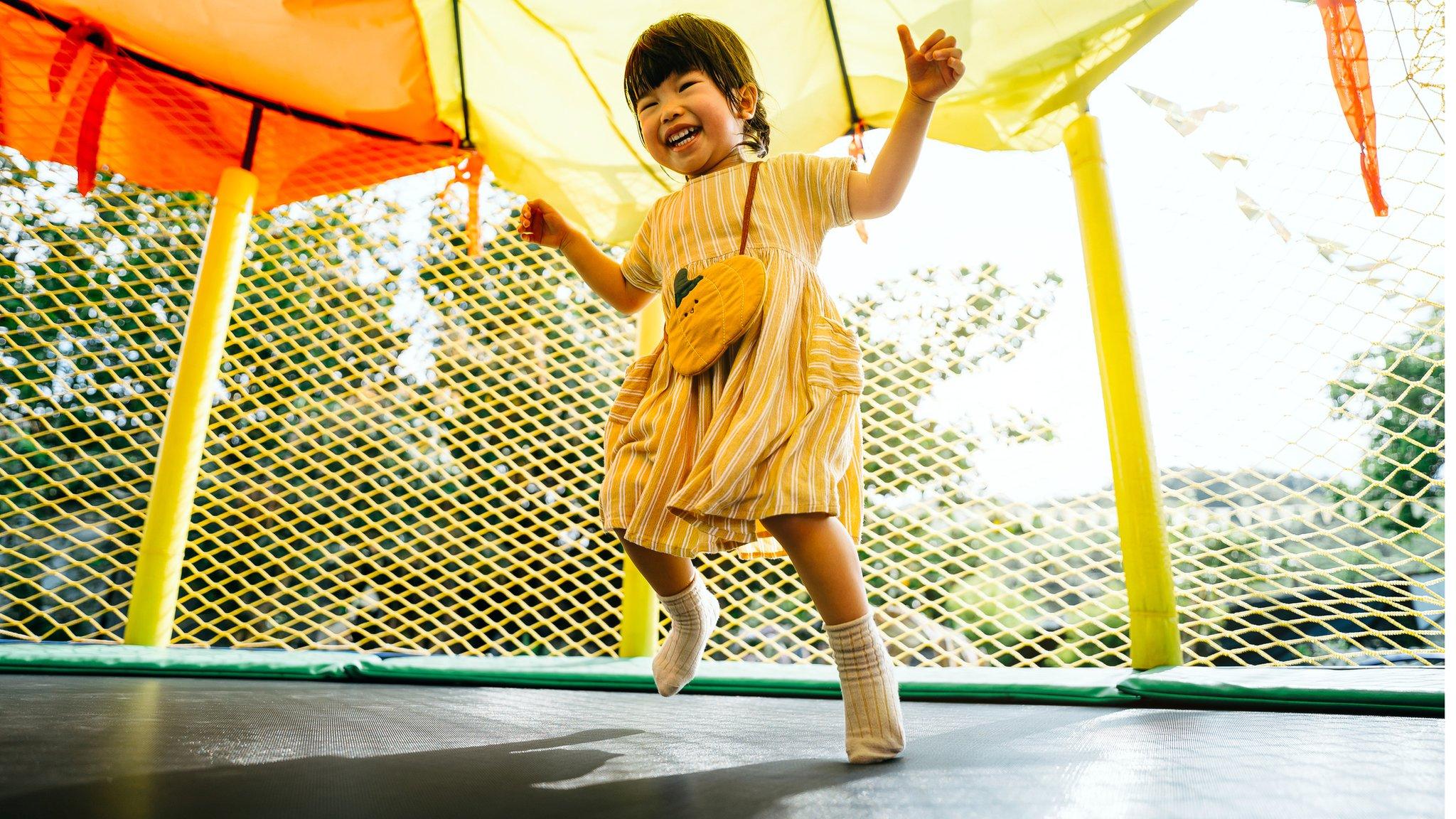Rebound therapy: The zero-gravity exercise that gets children screaming 'more'
- Published
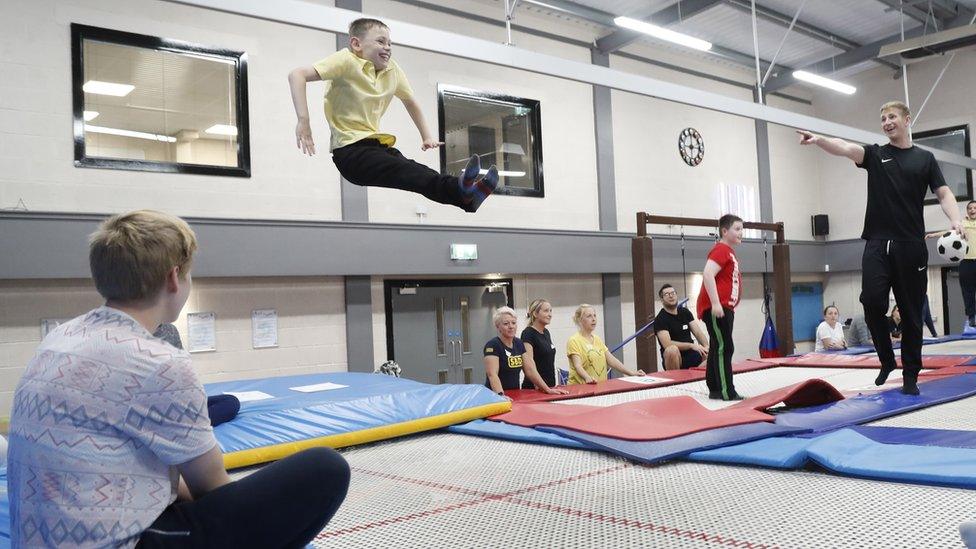
Trampolines can be a fun way to blow off steam. But for those with physical and learning difficulties they can also offer a gravity-free way to exercise and improve communication skills, as Daniel Hall explores.
The ambient lighting changes from green to purple and music plays as children bounce up and down. They scream with delight and smile as a parachute is lowered over their heads.
This is the Rob Armstrong Rebound Therapy Centre at Hadrian School in Newcastle upon Tyne.
And while trampolines might just seem like a fun piece of gym equipment, their vibrations can actually provide a vital form of therapy and exercise.
The combination of the movement of the 'bed' or webbing, combined with zero-gravity mid-bounce allow for exercises that can improve muscle and bone strength while enhancing movement patterns. It can also help students get used to changing direction, engaging with the environment around them and help to relax their muscles.
"Rebound is good fun. It makes me laugh and I have a happy time. My favourite game is Jelly on a Plate," says Joe, 10, who has therapy once a week.
The game sees instructors bounce the webbing of the large gymnastic trampoline while Joe tries to stay on his feet to help improve his balance.
Therapist Rob Oglethorpe says: "Rebound therapy has a lot of benefits for profoundly disabled children. It can lower or raise muscle tone, build up muscle memory, and even fatigue children.
"There's a big sensory aspect to rebound therapy. At the highest point of a bounce, students are completely weightless and are able to focus entirely on their own bodies, rather than being overstimulated by everything else around them."
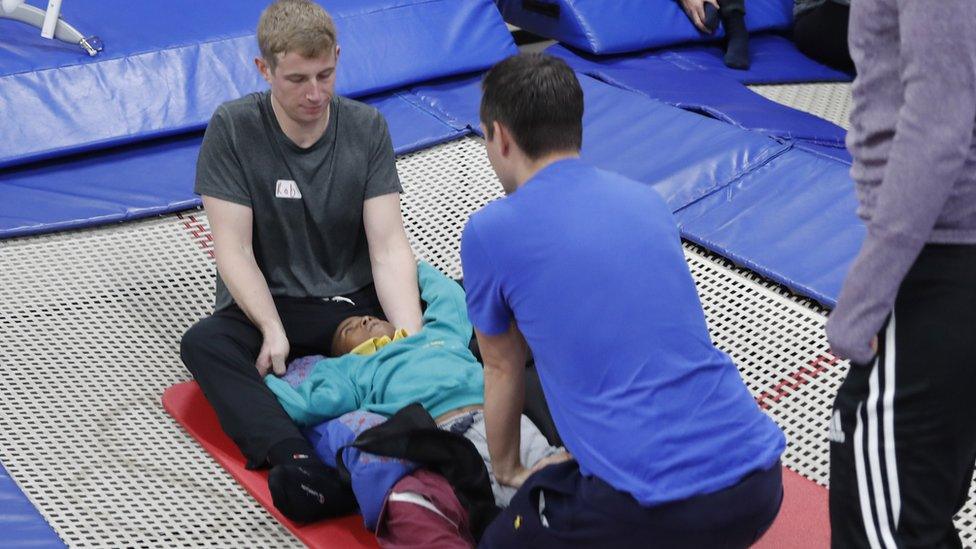
For those with disabilities where messages between the brain and muscles to relax and tense are blocked, the vibrations help prompt this movement.
One of those involved in the parachute game is eight-year-old Nicole Rich who has the regressive brain condition, Batten Disease.
Her father, Mathew, says: "Nicole's muscles can be very high toned because of her condition. For her, it's as though she's lifting weights constantly. As soon as Nicole starts on the trampoline it counteracts that movement, and she becomes very relaxed. By the end of it, she's a different child."
It has had such a positive effect that Mathew has learned how to use the therapy at home to help his non-verbal daughter.
"Without rebound therapy, Nicole wouldn't be able to do anything that she does," he says. "She goes to school five days a week, she does rebound and hydrotherapy. She's a happy, cheery child and she's got a great quality of life. Without rebound during lockdown, you could really see Nicole's muscle tone getting tighter."
The centre is a shared space and as such therapy sessions were paused during the first Covid lockdown in March 2020. Since then, it has become Covid-secure so it can continue to offer sessions both for those at the school and in the wider community.
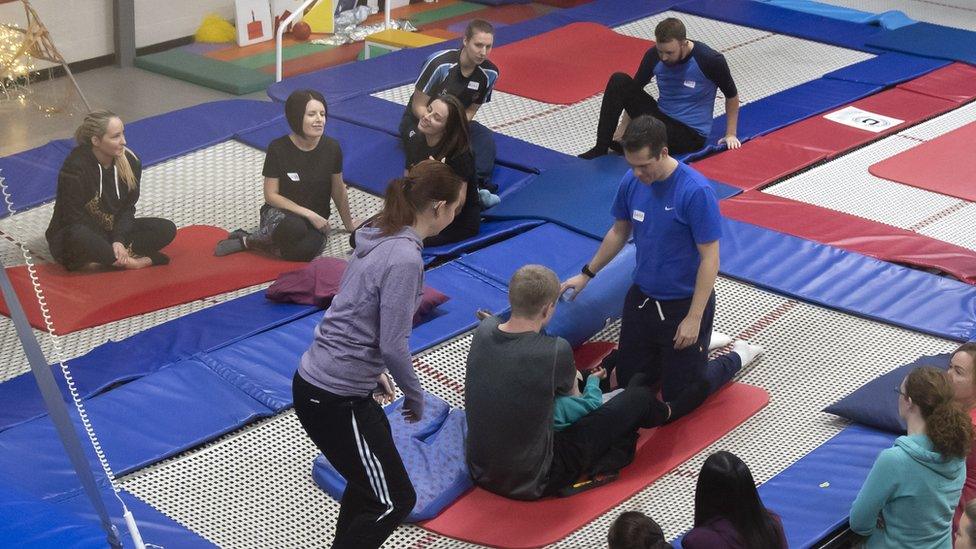
The school itself caters for children with a range of complex special and educational needs and rebound sessions involve most of the teaching staff - from occupational therapists to speech and language therapists.
Oglethorpe says: "Lots of kids won't talk or sign before going on the trampoline. However, there are loads of methods of communication.
"Some children will build up a vocabulary of symbols over time, while others will use signs if they're non-verbal.
"When children are excited and feeling enthusiastic, they communicate to demand more bounces, but the idea is that over time the users' communication methods or pathways build up and transfer to other environments, such as back in the classroom."
A word in all bouncers vocabularies is "more". As the teachers bring the trampoline to a stop and ask: "Do you want more?" They are met with screams of delight - and a non-verbal student signals "yes" by hitting the trampoline.
George, not his real name, says the therapy has given him a "hugely changed child" whose health has improved because of it.
He says: "Their face explodes in a smile when they're on the trampoline. They have got so much more strength, they completely enjoy it, so they engage with school really well.
"Rebound is very supportive emotionally too. It gets you emotionally engaged and builds up trusting relationships with adults."
The centre has a ceiling hoist, the largest of its kind in the world according to the manufacturers, which means wheelchair-users can be picked up and lowered onto any of the trampolines.
"In previous schools, a manual hoist was wheeled out and our child could only be put on the edge of the trampoline. Now, they can go on any of the trampolines," George says.
The therapy continues once the student has finished bouncing. The area surrounding the trampolines has physical equipment which rolls, rocks, swings, and vibrates, in order to meet the children's sensory needs before they return to the classroom.
Abbie Clelland, 19, attends weekly community sessions.
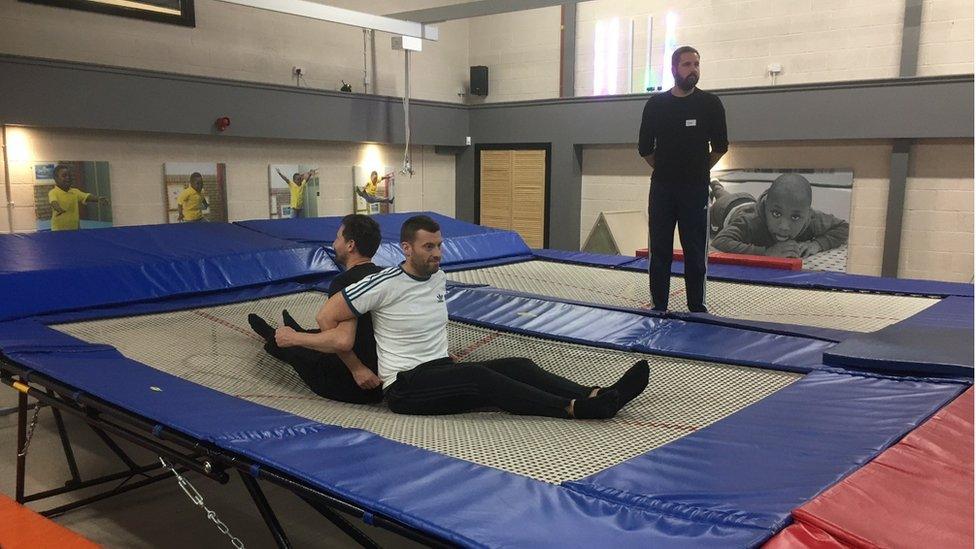
Her mother, Debbie, says: "Rebound makes Abbie focus and concentrate. It's when we get contact and vocalisation, which is a major step for her. I've always wanted her to do physical activity and exercise, and it is lovely to see it making her so happy. She's a giggler!"
Hadrian School has started to offer advice to other schools about how they might use trampolines for therapy, which the NHS also offers. And Rollings and Oglethorpe are also collaborating on a book about it.
The school also hopes to build a hydrotherapy pool adjacent to the rebound centre.
Headteacher Chris Rollings, who has been a rebound specialist for 40 years, says: "The big issue is that when our young people get to 19, the support in the specialist sector stops.
"We've made the rebound centre accessible to the whole community after hours, and we hope to do the same with the hydrotherapy pool.
"Hopefully, it'll become a disability centre for the northeast."
For more disability news, follow BBC Ouch on Twitter, external and Facebook, external and subscribe to the weekly podcast on BBC Sounds.

Related topics
- Published18 January 2021
